 Attorney Justine Kasznica would be the first to admit that she moved to Pittsburgh to take a chance on an apparent regional business renaissance driven by a promising technology sector. Over time, the region hasn’t disappointed.
Attorney Justine Kasznica would be the first to admit that she moved to Pittsburgh to take a chance on an apparent regional business renaissance driven by a promising technology sector. Over time, the region hasn’t disappointed.
“It’s an incredibly exciting time to be in this region and to be an attorney working with emerging technologies,” said Kasznica, who quickly would find her way into the center of Pittsburgh’s technology universe and help drive significant industry growth as part of a flourishing entrepreneurial ecosystem here.
“We are absolutely capturing a moment in history in this tri-state region,” she said. “To be able to experience the outputs of the efforts of the technologists across the region and to be part of the investor and adviser teams who are helping them grow is as rewarding as it is exciting.”
Today, Kasznica serves as a shareholder of Babst Calland, leading the firm’s emerging technologies group and serving on the front lines of a local industry sector that has gained global recognition while also facing its share of business and legal challenges. Babst Calland is one of the Pittsburgh region’s largest law firms…
To view the full article and video interview, click here.
To view the PDF, click here.
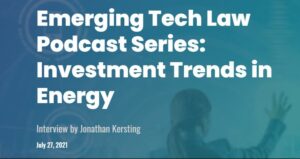 In this episode of the Emerging Tech Podcast Series, Justine Kasznica and Ashleigh Krick of Babst Calland’s Emerging Technologies Group talk to Jonathan Kersting of the Pittsburgh Technology Council about the latest investment trend in energy as reported from the 2021 Babst Calland Energy Report.
In this episode of the Emerging Tech Podcast Series, Justine Kasznica and Ashleigh Krick of Babst Calland’s Emerging Technologies Group talk to Jonathan Kersting of the Pittsburgh Technology Council about the latest investment trend in energy as reported from the 2021 Babst Calland Energy Report.
They discuss how public government funding is driving investment in emerging energy technologies like energy storage and hydrogen. They will also detail how VC and private equity investments are at a record high and what’s driving the growth.
Listen to the podcast here.
 On this episode of the Pittsburgh Technology Council Emerging Tech Podcast Series, Babst Calland’s Justine Kasznica and Ashleigh Krick, Esq.
On this episode of the Pittsburgh Technology Council Emerging Tech Podcast Series, Babst Calland’s Justine Kasznica and Ashleigh Krick, Esq.
talk about the latest investment trend in energy as reported from the 2021 Babst Calland Energy Report. They discuss how public, government funding is driving investment in emerging energy technologies like energy storage and hydrogen. The will also detail how VC and private equity investments are at a record high and what’s driving the growth.
Listen to the podcast here.
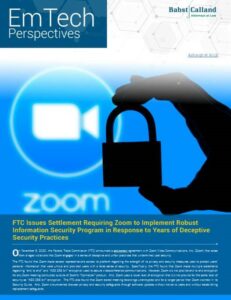 On November 9, 2020, the Federal Trade Commission (FTC) announced a settlement agreement with Zoom Video Communications, Inc. (Zoom) that arose from alleged violations that Zoom engaged in a series of deceptive and unfair practices that undermined user security.
On November 9, 2020, the Federal Trade Commission (FTC) announced a settlement agreement with Zoom Video Communications, Inc. (Zoom) that arose from alleged violations that Zoom engaged in a series of deceptive and unfair practices that undermined user security.
The FTC found that Zoom made several representations across its platform regarding the strength of its privacy and security measures used to protect users’ personal information that were untrue and provided users with a false sense of security. Specifically, the FTC found that Zoom made multiple statements regarding “end-to-end” and “AES 256-bit” encryption used to secure videoconference communications. However, Zoom did not provide end-to-end encryption for any Zoom meeting conducted outside of Zoom’s “Connecter” product. And, Zoom used a lower level of encryption that did not provide for the same level of security as “AES 256-bit” encryption. The FTC also found that Zoom stored meeting recordings unencrypted and for a longer period than Zoom claimed in its Security Guide. And, Zoom circumvented browser privacy and security safeguards through software updates without notice to users and without establishing replacement safeguards.
Read more.
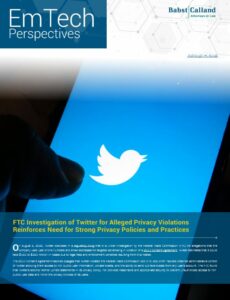 On August 3, 2020, Twitter disclosed in a regulatory filing that it is under investigation by the Federal Trade Commission (FTC) for allegations that the company used user phone numbers and email addresses for targeted advertising in violation of a 2011 Consent Agreement. Twitter estimates that it could face $150 to $250 million in losses due to legal fees and enforcement penalties resulting from this matter.
On August 3, 2020, Twitter disclosed in a regulatory filing that it is under investigation by the Federal Trade Commission (FTC) for allegations that the company used user phone numbers and email addresses for targeted advertising in violation of a 2011 Consent Agreement. Twitter estimates that it could face $150 to $250 million in losses due to legal fees and enforcement penalties resulting from this matter.
The 2011 Consent Agreement resolved charges that Twitter violated the Federal Trade Commission Act (FTC Act) when hackers obtained administrative control of Twitter allowing them access to non-public user information, private tweets, and the ability to send out fake tweets from any user’s account. The FTC found that Twitter’s actions neither upheld statements in its privacy policy, nor provided reasonable and appropriate security to prevent unauthorized access to nonpublic user data and honor the privacy choices of its users.
Read more.
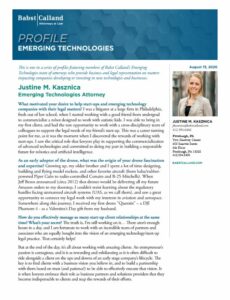
This is one in a series of profiles featuring members of Babst Calland’s Emerging Technologies team of attorneys who provide business and legal representation on matters impacting companies developing or investing in new technologies and businesses.
Read more.
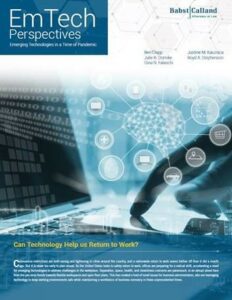 Can Technology Help Us Return to Work?
Can Technology Help Us Return to Work?
Coronavirus restrictions are both easing and tightening in cities around the country, and a nationwide return to work seems further off than it did a month ago. But it is never too early to plan ahead. As the United States looks to safely return to work, offices are preparing for a radical shift, accelerating a need for emerging technologies to address challenges in the workplace. Separation, space, health, and cleanliness concerns are paramount, in an abrupt about-face from the pre-virus trends towards flexible workspaces and open floor plans. This has created a host of novel issues for business administrators, who are leveraging technology to keep work environments safe while maintaining a semblance of business normalcy in these unprecedented times.
Read More.
On Thursday, June 11, 2020, Attorneys Justine Kasznica and Carl Ronald joined the Scott Institute’s Jay Whitacre and Anna Siefken for an informative discussion, “From Idea to Invention to Intellectual Property: What Startups and Innovators Need to Know.” To view this discussion, click here.
Tags: Copyrights,
Due Diligence,
Innovation,
Intellectual Property,
Invention,
Patents,
Startups,
Strategy,
Technology,
Trade Secret,
Trademarks

An artist’s rendering of NASA’s VIPER rover, which will roam the Moon’s south pole looking for water ice.
(Source: NASA)
Today, we are thrilled to celebrate with Astrobotic Technology, Inc., a Pittsburgh-based space robotics and lunar transportation and logistics company, on receiving a $199.5 NASA award to send the NASA Volatiles Investigating Polar Exploration Rover (VIPER) to the lunar surface in 2023 to search for water-ice. Not only is this a historically significant mission, as it is the first “resource-mapping” mission of its kind, this is an amazing achievement for a company that that has worked tirelessly for 13 years to prove a new commercial space market. For more information, click here.
Our Emerging Technologies attorneys are fortunate to work with incredible innovators, entrepreneurs and visionaries pushing the frontiers of technology and industry. We love to showcase our clients, especially when they hit notable milestones that may be of interest to our entire Babst Calland EmTech family.
Our newly launched EmTech Blog will enable us to do more of these Client Spotlights, so stay tuned! If you would like your company to be featured, please send accomplishments or highlights to jkasznica@babstcalland.com.
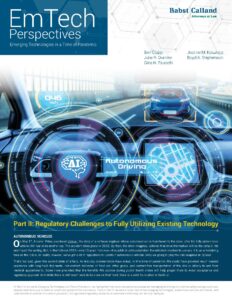 Regulatory Challenges to Fully Utilizing Existing Technology
Regulatory Challenges to Fully Utilizing Existing Technology
On May 1st, Amazon Prime premiered Upload, the story of a software engineer whose consciousness is transferred to the cloud after his fully autonomous vehicle (AV) rear-ends another car. The accident takes place in 2033. By then, the show imagines, vehicles that drive themselves will be the default. We won’t spoil the ending. But, in the fictional 2033 only 13 years from now—the public is astounded when the vehicle is involved in a wreck. It is an entertaining take on the future. In reality, however, we’ve got a lot of regulations to update if autonomous vehicles (AVs) are going to play the role imagined in Upload.
Read More.
Tags: Autonomous Vehicles,
Coronavirus,
COVID-19,
Drones,
Efficiency,
Emerging Technology,
Industry News,
Innovation,
Mobility,
Pandemic,
Robotics,
Tech Industry,
Technology,
Transportation
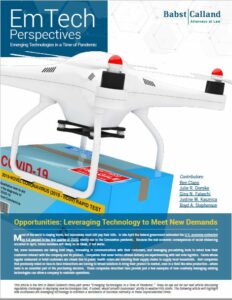
Opportunities: Leveraging Technology to Meet New Demands
Most of the world is staying home, but businesses must still pay their bills. In late April the federal government estimated the U.S. economy contracted by 4.8 percent in the first quarter of 2020, mostly due to the Coronavirus pandemic. Because the real economic consequences of social distancing occurred in April, future numbers will likely be as bleak, if not worse.
Yet, some businesses are taking bold steps, innovating in communications with their customers, and leveraging pre-existing tools to retool how their customers interact with the company and its product. Companies that never before offered delivery are experimenting with last mile logistics. Farms whose regular restaurant or hotel customers are closed due to public health orders are retooling their supply chains to supply local households. And companies that previously relied on face-to-face interactions are turning to virtual solutions to bring their product to market, even in a field like wine production—where taste is an essential part of the purchasing decision. These companies described here provide just a few examples of how creatively leveraging existing technologies can allow a company to maintain operations.
Read More.
Tags: Commercial,
Coronavirus,
Corporate Law,
COVID-19,
Drones,
Efficiency,
Emerging,
Emerging Technology,
Industry News,
Innovation,
Last Mile Logistics,
Logistics,
Mobility,
Pandemic,
Regulations,
Regulatory,
Remote Learning,
Robotics,
Robots,
Supply Chain,
Tech Industry,
Technology,
Transportation,
US DOT
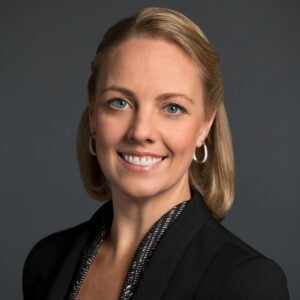
Firm to Develop Legal/Commercial Framework for Payload Service for NASA’s Artemis Human Landing System
Babst Calland today announced that under a recently announced NASA award, Astrobotic Technologies, Inc. (Astrobotic) has selected the firm to develop what could become the first-of-its-kind blueprint for commercial payload delivery to space for the Artemis human missions as well as future human-crewed space missions.
Pittsburgh-based Astrobotic will be developing the commercial payload service for Dynetics (a Leidos subsidiary), one of three prime contractors (alongside SpaceX and Blue Origin) selected by NASA to design and build a commercial Human Landing System (HLS) and compete to build a privately-developed system to take the first woman and next man to the lunar surface in 2024 as part of the NASA Artemis program.
Read More.
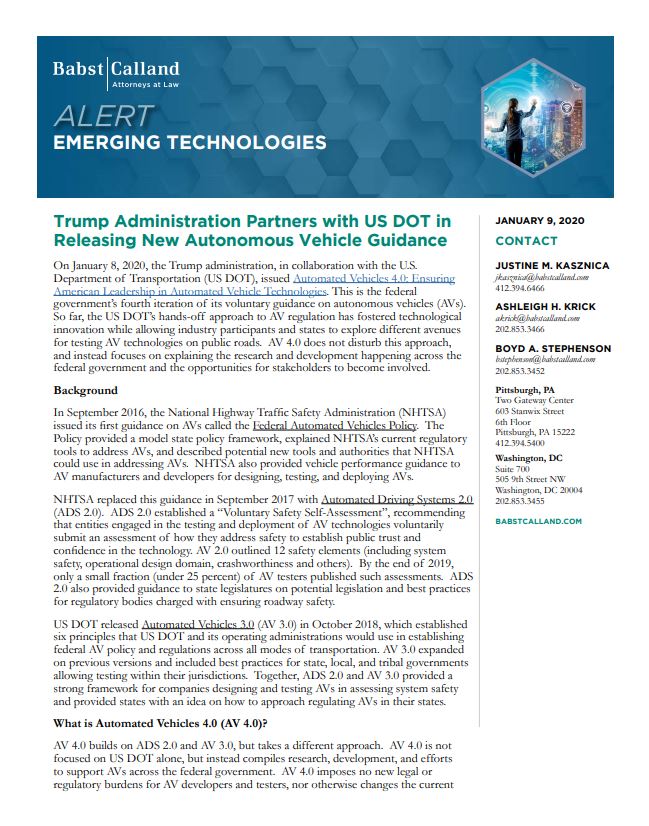 On January 8, 2020, the Trump administration, in collaboration with the U.S. Department of Transportation (US DOT), issued Automated Vehicles 4.0: Ensuring American Leadership in Automated Vehicle Technologies. This is the federal government’s fourth iteration of its voluntary guidance on autonomous vehicles (AVs). So far, the US DOT’s hands-off approach to AV regulation has allowed for technological innovation while allowing industry participants and states to explore different avenues for testing AV technologies on public roads. AV 4.0 does not disturb this approach, and instead focuses on explaining the research and development happening across the federal government and the opportunities for stakeholders to become involved.
On January 8, 2020, the Trump administration, in collaboration with the U.S. Department of Transportation (US DOT), issued Automated Vehicles 4.0: Ensuring American Leadership in Automated Vehicle Technologies. This is the federal government’s fourth iteration of its voluntary guidance on autonomous vehicles (AVs). So far, the US DOT’s hands-off approach to AV regulation has allowed for technological innovation while allowing industry participants and states to explore different avenues for testing AV technologies on public roads. AV 4.0 does not disturb this approach, and instead focuses on explaining the research and development happening across the federal government and the opportunities for stakeholders to become involved.
Read More.
 Babst Calland and our technology affiliate, Solvaire, have been performing complex due diligence, discovery, and document management projects for clients for more than 20 years. Our clients look to us for due diligence guidance in the areas of acquisitions and divestitures, as well as complex corporate, commercial and real estate transactions.
Babst Calland and our technology affiliate, Solvaire, have been performing complex due diligence, discovery, and document management projects for clients for more than 20 years. Our clients look to us for due diligence guidance in the areas of acquisitions and divestitures, as well as complex corporate, commercial and real estate transactions.
The firm has a long history of utilizing the latest technologies to enhance contract review. And, in the last few years, the firm has taken a deep look at AI-assisted review and its ability to enhance efficiency and reduce cost for clients. Saying that we have become “AI Believers” in the process is an understatement. After many AI tool evaluations, trials, and getting numerous AI projects under our belts, we have become our clients’ go-to resource in leveraging AI for their benefit.
Read More.
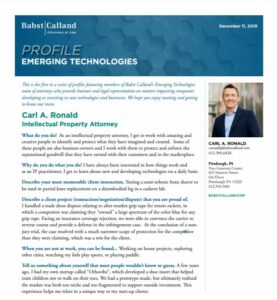 This is the first in a series of profiles featuring members of Babst Calland’s Emerging Technologies team of attorneys who provide business and legal representation on matters impacting companies developing or investing in new technologies and businesses. We hope you enjoy meeting and getting to know our team.
This is the first in a series of profiles featuring members of Babst Calland’s Emerging Technologies team of attorneys who provide business and legal representation on matters impacting companies developing or investing in new technologies and businesses. We hope you enjoy meeting and getting to know our team.
Read More.
 Attorney Justine Kasznica would be the first to admit that she moved to Pittsburgh to take a chance on an apparent regional business renaissance driven by a promising technology sector. Over time, the region hasn’t disappointed.
Attorney Justine Kasznica would be the first to admit that she moved to Pittsburgh to take a chance on an apparent regional business renaissance driven by a promising technology sector. Over time, the region hasn’t disappointed. In this episode of the Emerging Tech Podcast Series,
In this episode of the Emerging Tech Podcast Series, 
 On August 3, 2020, Twitter disclosed in a
On August 3, 2020, Twitter disclosed in a 







